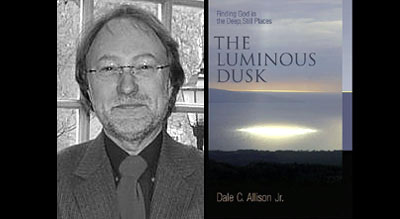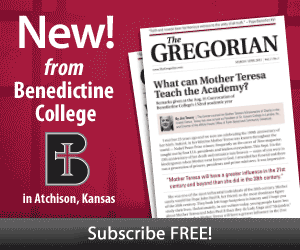Spirituality
Well-Springs of Belief: An undiscovered contemporary classic

As Holy Week began and I reviewed my slack observance of Lent—that is, as I reflected on “things done and left undone”—I found I had wasted my soul more than anything through needless distraction. Pascal pointed out how kings have their minstrels and courtiers and fools to ward off the possibility of self-reflection, as he diagnoses how divertissement keeps everyone from confronting the mystery of his life. This past penitential season, I had let Hardball, CNN’s The Situation Room, and innumerable panels led by Brit Hume on Fox perform the same dubious service. As important as the election may be, I could as well have been tying-off every evening and plumping out a vein as I prepared for my nightly dose of political smack. This is not even to speak of RealClearPolitics and the smaller hits it afforded. There were always at least 13 different ways of looking at the same political blackbird.
This was one of the many things I had to confess as I prepared to get “locked up in the box,” or for confession—how I had displaced my true life in getting and spending and just plain messing around.
There’s a lovely book called The Luminous Dusk by Dale Allison (Eerdmans, 2006) which addresses the central problem of diversion in the spiritual life. I believe to be an undiscovered contemporary classic. I’ve been reading and re-reading it now for 15 years, since much of the book’s material was published in a previous edition.
The Luminous Dusk addresses both the macro and micro issues of distraction and directs the reader from these to the wellsprings of Christian spirituality—silence, darkness, light, asceticism, the Scriptures, the saints, and prayer. It’s a significant read in any season, but particularly during Advent, Lent or at the beginning of a retreat.
Allison argues that disbelief in our world is as much the result of our loss of contact with the natural world and its inducements of wonder as it is philosophic trends. Almost everywhere, the lights of the city are so bright that we cannot see the stars. We rarely cry out for God’s help even in the midst of hurricanes, because we feel ourselves the masters of nature. The psalmist asks, “Whither shall I flee from thy presence?” (Ps. 139:7, KJV) “One good answer,” Allison says, “is inside a house in the city.”
As apt as his analysis may be, Allison’s praise for the sources of Christian spirituality elevates the book beyond argument into a deeply affecting hymn. He leads the reader to desire silence; to find a monastic chapel in the pre-dawn hours where it’s possible to worship by candlelight; to read the Scriptures in such a deeply meditative way that they become as meat and drink.
The book’s prose is lucid, witty, and enlivened by convincing analogies. Allison’s wide-learning allows him a range of allusion that’s stunning and yet never merely showy.
“Our tradition teaches that confrontation with silence is requisite for the sincere religious pilgrim. Even Jesus, according to the Four Gospels, felt the need to go off by himself for prayer and contemplation… Our technology, however, has so populated the world with so many devices of distraction that it is now possible to spend the entire span of a human life without learning of silence. I know of a woman who cannot even sleep without the noise and light of her television.
This is no good omen…
Perhaps Nietzsche was half-right. Maybe we have murdered God. But maybe the moral wounds were inflicted by something other than our clever arguments. Perhaps we finally did away with God indirectly, by exterminating silence. Artificial noise has become an unholy liturgy that unites all in the aimless rush toward collective amnesia and banality, away from Nature’s God and God’s self-imposed muteness of love. As Jerome asked, “Where there is the beating of drums, the noise and clatter of pipe and lute, the clanging of cymbals, can any fear of God be found?””
Here we have Jesus, Nietzsche, and Jerome, all in a seamless exposition that drives us toward stark recognitions, both of the world in which we live and how we use the world to escape hearing the “self-imposed muteness” of God’s love, which never clamors, never insists, but unceasingly calls, in a whisper, a still small voice. Page after page is like this, which is what makes this book great.
So many passages deserve quoting, but here’s just one more, on the necessity of confronting God in the darkness of his mystery.
“But it is not just literal, external darkness that the pilgrim should happily enter. There must also be an inner darkness, an unlighted chamber within. Although we should find God in the natural world around us, and while we are commanded to find God in the neighbor next to us, there is also an imperative for turning to the Divine that requires a turning from the world, what Evelyn Underhill calls “a deliberate drawing-in from the circumference to the centre.” Here I follow Meister Eckhart who once interpreted darkness as “a silence and a stillness apart from the commotion of creatures.” Before this is a Presence, there must be an absence….We were physically formed in the darkness of the womb, and we are spiritually formed in the darkness of our minds. As in the creation story, so too in each individual life: darkness comes before light.”
The Luminous Dusk is one of those books that makes you want to tear your hair out and ask what in the heck you think you’ve been doing. This life holds the possibility of knowing God! What could be more interesting than that? Wolf Blitzer with his soldier-boy bearing and snappy questions? Oh, my…
But the encounter with God entails an encounter with my personal darkness. I already know or suspect the bollocksed emptiness I am, and so I delay whatever appointments I have with the Almighty until another time. But the dusk is luminous, the darkness filled with light, and God still seeks, in his mercy, in his refulgent outpourings, to give himself. Why can’t I get this?
Allison’s The Luminous Dusk is a big help—one I recommend with the greatest urgency.
By AT 03.25.08 05:12PM Not Rated
Yes, it’s a real pain. As T.S. Eliot said, “Humankind cannot bear much reality.”
By AT 03.25.08 07:12PM Not Rated
This book sounds very interesting. Did you find anything in it that opposed traditional Catholic mysticism?
By AT 03.25.08 07:19PM Not Rated
well i admit that for most of lent i was either watching t.v., on the computer or eating.
which was fun.
why is it so hard not to do all of that?
By AT 03.25.08 07:47PM Not Rated
Chassup, no, the book is very much an ecouragement to pursue traditional Catholic mysticism. Allison takes us back to the roots of that tradition—the advantages, one might say, of the ancients—and then shows how we’ve alienated ourselves from the primary experiences that were so important to the Desert Fathers and their successors in Catholicism and Orthodoxy.
By AT 03.25.08 07:51PM Not Rated
Liberty_Student37 (what is the source of your moniker? I keep thinking of Liberty University. True?); the couch and the TV are my own personal vices as well, particularly whenever I go brain dead (usually abut 8 PM in the evening).
By AT 03.25.08 08:12PM Not Rated
(very true)
By AT 03.25.08 09:08PM Not Rated
I just want to let you know that I’m not being cheap with the stars. I wanted to rate the article a 5, but I clicked on the 4 by accident and then I can’t change it.
But in response to your response, Mr. Fickett, Eliot wasn’t so politically correct as to say “humankind”. As a woman I already understand that the term “mankind” is inclusive, and “humankind” is just too cumbersome to say in the year 2008. BC, of course.
![]()
By AT 03.26.08 12:09AM Not Rated
REDKIM, thanks for your note. I checked my memory as to the Eliot. See “Burnt Norton” in FOUR QUARTETS lines 44-45: “Go, go go, said the bird: human kind/ Cannot bear very much reality.” That’s one of the first uses of the term I remember ever seeing, although you are right that Eliot was hardly a poster boy for political correctness. I remember how all my professors heaved a sigh of relief when we made it to William Carlos Williams and they could quote his sneering references to Eliot.
By AT 03.26.08 02:07AM Not Rated
Wonderful!
By AT 03.26.08 04:21AM Not Rated
I remember coming across a similar idea about silence last year - i.e. that our post-modern obsessive avoidance of it has devastating consequences for even the possibility of an authentic spiritual life - in Catherine Doherty’s “Poustinia”. I recognized the affects of its absence in my own life and resolved to spend my hour plus commute to work in silence. (Well, relative silence anyhow, since I was commuting from NYC. Let’s call it “radio silence”.) This great opportunity to bring good out of evil disappeared when I moved to within five minutes of the office. The days passed, I forgot, and my life has become “noisy” again, and as always otherwise superficial doubts and difficulties seem to be getting fatter, healthier, and increasingly obnoxious…
All this to say: I’ve recently experienced the difference (even imperfect) silence, or its absence makes, so thanks for the excellent reminder and reference. My next stop is the used book shelves of Amazon ...
By AT 03.27.08 03:52PM Not Rated
My favorite place to vacation is the ocean. I insist on being right on the beach so I can see, feel, hear, smell and taste the ocean all the time. The vastness of the ocean is a reminder to me of my smallness, and of God’s greatness, it is simple and uncomplicated, but unavoidable and unstoppable. For me, the ocean is a sort of proof that God exists.
While at the beach, I do not allow any news—no newspapers, no TV news, no radio news—also no talk radio, no talk of politics, no arguments, no griping or whining, no complaining, no fighting, no schedule, no work, no plans. Crying is strictly forbidden and I refuse to read anything but fiction. This is often hard to accomplish with a wife and many children along, but I insist.
During these beach visits, I enjoy a vibrant prayer life, frequent and enlightening contemplative moments, and increased creativity. I am convinced that rest from the noise of my usual day-to-day is the key. As I leave the shore to return home, I am envious of the early Desert Fathers who lived in contemplative solitude, my family thinks me antisocial.
By AT 03.27.08 08:37PM Not Rated
Chassup, thanks for your thoughtful post. You are always such!
Also, there’s a frightening similarity in our vacation styles, although I haven’t been able to afford one in the past couple of years. But the ocean, fiction, and NOTHING is the order of the day. My wife told a friend, who was threatening to invite us along on a vacation, that we’d appreciate it, but she had to understand my downtime habits. The power might be completely off.
Cheers, H.
By AT 03.28.08 03:23AM Not Rated
Thank you for reminding me how blessed I am that I live 20 minutes away from the ocean. During the summer, you can catch me there as early as 7 AM but no later than 9 AM on Saturday mornings. By that time the beach starts to fill up and my silence time comes to it’s end.
By AT 03.01.09 04:40AM Not Rated
Solitude is what the soul is searching for! Yes, the ocean is one of the best places as Chassup mentioned, but since the ocean is not readily accessible, the Blessed Sacrament is for me, the most peaceful place on earth, and if you’re lucky, the quietness of your room, alone, away from the noise of technology, work, people ; having only a book, music as company, and of course, Jesus! Wow! That can never be elusive, if we just try especially this time of lent. I do this when my husband is at work, otherwise it’s kind of difficult to accomplish. ha ha. God bless!









By redkim AT 03.25.08 03:26PM Not Rated
I hate reading articles like this. I prefer to go about my daily business, entirely distracted. Then I come on here, read this stuff, and realize that I am…distracted.
You make me pause and think. I hate that.